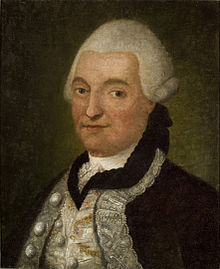Magnus Gottfried Lichtwer
Magnus Gottfried Lichtwer the Younger (born January 30, 1719 in Wurzen , † July 7, 1783 in Halberstadt ) was a German lawyer and fabulous poet during the Enlightenment .
Life
Magnus Gottfried Lichtwer was the son of the lawyer of the same name, Magnus Gottfried Lichtwer the Elder (1680-1721) and his wife Dorothea Magdalena Wichmannshausen (1692-1727). When Lichtwer was two years old, his father died and the boy was promoted from then on by his guardian, Chancellor Zahn. This enabled him from 1743 to study at the University of Leipzig (history, law, philosophy). Lichtwer later switched to the University of Wittenberg , where he worked as a Dr. jur. was able to successfully complete his studies. In the same month Lichtwer achieved the title of Magister in Philosophy . In 1742 he joined the Minerva Masonic Lodge at the three palms in Leipzig.
Due to an accident, Lichtwer lost almost all of his eyesight, but this did not prevent him in his career or in his writing. Lichtwer got his first job at the University of Wittenberg, where he got to know the works of the philosopher Christian Wolff from 1747 , since Lichtwer held lectures on legal philosophy there as a private lecturer . The philosophy of this enlightener inspired Lichtwer in 1758 to publish the didactic poem "The Right of Reason".
The publisher Wolfgang Deer supported Lichtwer that he could publish his " Aesopian Fables" in 1748 . These fables can certainly be seen as independent works, but they reveal a certain closeness to Christian Fürchtegott Gellert . On the occasion of Lichtwer's hundredth birthday, Jakob Minor published his fables in the German National Literature series .
In 1749 Lichtwer married Henriette Sophie Albinus in Wittenberg and had three daughters with her. He and his family settled in Halberstadt. In 1751 he became the “Wirkl. Royal Government Council in the Principality of Halberstadt ”and thus got a job in the administration. His career led from the office of consistorial councilor (1760) to that of criminal judge (1762) and left Lichtwer little time for his writing ambitions. This explains why Lichtwer made friends with Johann Christoph Gottsched and Johann Wilhelm Ludwig Gleim , but had only marginal contact with the Halberstadt poets' circle of “Father Gleim”.
As a judge, Lichtwer was later also a member of the state deputation .
Lichtwer died at the age of 64 on July 7, 1783 in Halberstadt. 45 years after his death, his grandson Ernst Ludwig von Pott and Friedrich Cramer published a biography of his grandfather including his writings.
Works (selection)
- Fonts . Brüggemann, Halberstadt 1828.
-
Four books of Aesopian fables in bound writing . Leipzig 1748.
- From the fable contained therein the cats and the landlord comes the winged word "Blind Eyfer only harms" .
- The right of reason. A didactic poem . Leipzig 1758.
- Blind zeal only hurts! Fables, didactic poems . Reclam, Leipzig 1983.
- Lichtwer and Gottsched. Correspondence, fables, reviews . Ed. Walter Hettche. Aisthesis, Bielefeld 2003.
literature
- Biography of the poet in Magnus Gottfried Lichtwer. Fables (full edition). With biography of the poet (Family Library of the German Classics Volume 30.1844)
- Friedrich M. Eichholz: Magnus Gottfried Lichtwers, Königl. Government council life and merits . Mevius publishing house, Halberstadt 1784.
- Reiner Zieger (illustrations), Hans-Jürgen Moltrecht (text): You have to stay the little spoon. Magnus Gottfried Lichtwer, the fabulous poet from Wurzen . Kulturbund der DDR, Wurzen 1982.
- Walther Killy (Ed.): Literature Lexicon. Authors and works of German language. (15 volumes). Bertelsmann-Lexikon-Verlag, Gütersloh / Munich 1988–1991 (CD-ROM: Berlin 1998, ISBN 3-932544-13-7 ).
- Franz Muncker: Lichtwer, Magnus Gottfried . In: Allgemeine Deutsche Biographie (ADB). Volume 18, Duncker & Humblot, Leipzig 1883, pp. 558-561.
- Hans-Wolf Jäger: Lichtwer, Magnus Gottfried. In: New German Biography (NDB). Volume 14, Duncker & Humblot, Berlin 1985, ISBN 3-428-00195-8 , p. 469 f. ( Digitized version ).
- Johann Georg Meusel : Lexicon of the German writers who died from 1750 to 1800. Vol. 8, Gerhard Fleischer the Younger, Leipzig 1808, p. 241 (online) .
- Elisabeth Krüger: Magnus Gottfried Lichtwer - a German fabulous poet. Pp. 68-71 in: Wurzen 961-1961. Festschrift for the millennium. Published by the council of the city of Wurzen and the editorial team “Der Rundblick” Wurzen. Format A 5, 256 pages. Wurzen 1961.
Individual evidence
- ^ Eugen Lennhoff, Oskar Posner, Dieter A. Binder: Internationales Freemaurerlexikon , revised and expanded new edition of the edition from 1932, Munich 2003, 951 pages, ISBN 3-7766-2161-3 .
Web links
- Literature by and about Magnus Gottfried Lichtwer in the catalog of the German National Library
- Works by Magnus Gottfried Lichtwer in the Gutenberg-DE project
- Fables at librivox
- Lichtwer in the Internet Archive
| personal data | |
|---|---|
| SURNAME | Lichtwer, Magnus Gottfried |
| ALTERNATIVE NAMES | Lichtwer, Magnus Gottfried the Younger |
| BRIEF DESCRIPTION | German lawyer and fabulous poet |
| DATE OF BIRTH | January 30, 1719 |
| PLACE OF BIRTH | Spice up |
| DATE OF DEATH | July 7, 1783 |
| Place of death | Halberstadt |

